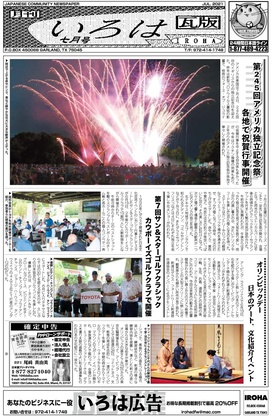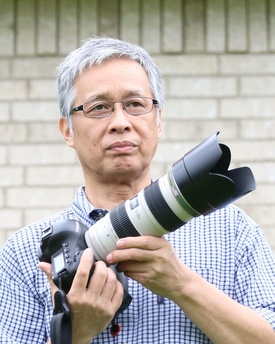Collaboration with local Japanese organizations
I have often heard of the free Japanese newspaper "Iroha" published in Dallas. However, as a California resident, I have never had the opportunity to learn about what kind of publication it is or what it contains. The publisher, Makoto Ueda, told me that this is because the paper is closely tied to the local Japanese community and does not disseminate information outside the region. As of August 2021, the paper does not publish an electronic version.
"Iroha" was first published in 1990, more than 30 years ago. Ueda came to the United States to work as a chef at a teppanyaki restaurant in Dallas, but later changed careers and became involved in camera repair. It is interesting to see how he went from such a different line of work to becoming a media publisher.
"There was a Japanese grocery store in Dallas, and the owner asked me to make a newsletter by adding articles to the direct mail that he mailed to his regular customers for promotional purposes. The reason was that people wouldn't read the mail if it was just advertisements. I refused, saying I had never done it before, but he insisted that I could do it. He said that I thought I could do it, so I said, "Well," and accepted. It was eight letter-sized pages. A friend of mine sent me a Japanese word processor from Japan, and I typed out the manuscript on it and cut and pasted it together to make it. It was a monthly publication, just like it is today. At first, the owner of the grocery store introduced me to advertisers, but then I started taking advertisements myself, and within two or three months we broke even. Two years later I quit my job repairing cameras and became a full-time editor of Iroha. The reason for this was that camera repairs were no longer as profitable as they had been before. New, more affordable models were coming out one after another, so fewer people were bothering to have their cameras repaired."
Thus, Ueda-san, who had no experience in media work, continued to cover local news while strengthening his relationship with the Dallas Japanese Society, the Japan-America Society, and the Japanese Supplementary School. The current content is a good read, covering a wide range of local news, from essays by Dallas residents to classifieds and Japanese-American news. The circulation is 5,000 copies, and the size is 16 pages in tabloid format.
"Considering the size of the Japanese community in Dallas, it is not a market where competing newspapers could coexist, so in the end, our newspaper was the only one that survived. I think five or six newspapers have been launched so far, and we took measures to accommodate them by improving the quality of our paper and making it color. Toyota relocated to Plano near Dallas around 2017, but unfortunately the size of the Japanese community there has not grown that much."
There is an impression that the Japanese population in Texas increased rapidly when Toyota moved there, but according to Ueda, this is not necessarily the case. That is why Ueda emphasizes that the aforementioned collaboration with local Japanese organizations that had existed for a long time was a major factor in building the foundation of the paper.
One person handles sales, interviews, and accounting
"I have been in charge of photographing events at the Dallas supplementary school for over 30 years. My own children also attended the supplementary school. So whenever there was an event like the entrance ceremony or graduation ceremony, I was asked to go and take photos. Then, every year, the Dallas supplementary school and the Houston supplementary school hold a softball game together, and I have been in charge of photographing that as well. As you can see, you can't survive in Dallas unless you are closely connected to the local Japanese community. I also cover events held by the Japan America Society and the Japanese Association of Dallas. I'm sure there are many readers who weren't able to attend the events but would like to know what they were like. But there are also people who attended the events and would like to see their faces in the paper."
Ueda told me how he goes out to interviews with agility. So, how many staff members does he have? In response to this question, Ueda answered simply, "It's just me. At one point, I asked an acquaintance to help with the administrative aspects, but I basically do everything by myself, from sales, planning, interviews, photography, writing, delivery, and accounting. My wife helps me with the accounting, though (laughs)."
When it comes to sales, Ueda seems to have his own beliefs: "If I don't think advertising will be effective, I sometimes turn down requests to advertise in places. They say they want Japanese customers, but I tell them straight out, 'Your store won't appeal to Japanese people.'"
Ueda has singlehandedly been publishing a publication that has been popular with the Japanese community in Dallas for over 30 years while sticking to his own beliefs. We asked him about his future plans.
"Are you planning to start anything new? Oh well, I'd rather just retire now (laughs). But even now, I feel the rewards of this job whenever I hear that a reader has gone somewhere or connected with someone because of the newspaper. Some readers even call if publication is delayed. But it's not that I want to hear such comments; I do it because I like it, regardless of what other people think. It is the policy of a newspaper publisher to never publish personal attacks or information that harms anyone. I wasn't trained in writing, and there may be typos and misspellings, but I am grateful that there are people who still want to read my newspaper."
I ended my online interview convinced that Ueda's unpretentious and honest attitude is the reason why Iroha has earned the trust of the Japanese community in Dallas for so long.
© 2021 Keiko Fukuda








